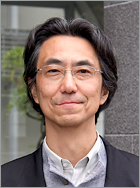Welcome Message
Annual Meeting of the Japan Society for
Bioscience, Biotechnology, and Agrochemistry, 2011
Kazumitsu Ueda

Please allow me to express a few words of welcome for the Annual Meeting of the Japan Society for Bioscience, Biotechnology, and Agrochemistry 2011.
Since 2006, this meeting in 2011 is the first meeting in 5 years that will be held at the Kyoto Women's University.The university campus is an easy 10-minute bus journey from JR Kyoto Station, Hankyu Kawaramachi Station, or Keihan Shichijo Station.
I am confident there will also be many participants in attendance who were touched by the warm hospitality of the students from the Kyoto Women's University at the annual meeting in 2006. As the appointed chair of the organizing committee, I would like to thank the Kyoto Women's University for providing their facilities for the 2011 meeting.
The meeting will run over four days from Friday, March 25th to Monday, March 28th. Day 1 (25th) will include the general meeting, awards ceremony, and prize acceptance speeches at Kyoto Kaikan in OkazakiPark. Following this, we will move to the Westin Miyako Hotel in Keage for the social gathering.
From the 26th to the 28th, we will hold various events at the Kyoto Women's University campus, including General Presentations, Symposium, Exhibitions, Luncheon Seminars&Symposium, Junior Bioscience, Biotechnology, and Agrochemistry Society Meeting, and Networking Reception.
Also, on the afternoon of Thursday the 24th, we will be holding a chemistry and biology symposium on the boundless health and dietary benefits of tasting great Japanese food at the Kyoto University Clock Tower Centennial Hall. Further, from the afternoon of the 28th until the 29th, we will be holding a Frontiers symposium at Shogoin in downtown Kyoto to encourage interaction between young researchers.
All presentations, including the General Presentations, will be given verbally using an LCD projector connected to the speakers' own computers. More and more presentations these days use microphotographs and highly detailed diagrams.
We believe it is necessary that important research findings be displayed in high definition and with sufficient clarity so that due consideration can be given to their content. Since, this will be the first time that lectures will be given using a presenters' own computer, therefore, we ask that presenters familiarize themselves in advance on how their computers work in regard to this.
The main theme for this year's meeting is "close collaboration." First, we have slightly altered the scope of the program to aim for "collaboration among fields." For the symposium, we aimed for the collaboration between each specialty field, and invited more than 15 speakers from neighboring countries to facilitate "collaboration between Asian countries."
A characteristic of the field of agrochemistry is that it is practiced with close regard to social needs. To further encourage "social collaboration," we will be holding events such as the expanded Science Cafe, High School–University collaboration symposium, Junior Bioscience, Biotechnology, and Agrochemistry Society Meeting, and the Industry–Academia–Government scientific exchange committee forum.
The expanded Science Cafe event will bring together Kyoto traditional restaurateurs and university researchers to test the scientific fusion of agrochemistry and Kyoto gastronomy. Here various experimental cuisines will be demonstrated and participants will be asked to join in taste testing, which will include commentaries by actual chefs. This event is also being planned to draw participants from the general public.
A High School–University collaboration symposium and the Junior Bioscience, Biotechnology, and Agrochemistry Society Meeting will be held to encourage collaboration with high schools.
To encourage collaboration with industries, we will hold the Industry–Academia–Government scientific exchange committee forum. Following on from this, will be a poster discussion in the networking area of the venue to facilitate interaction between the industries and academia.
Also as a new initiative, the Topics Awards that were previously conventional poster presentations will now be presented in a lecture format.
The Society trial course will give undergraduate students, international students, and researchers a taste of Society, which we hope will foster support for future Society activities.
Finally, I would like to express my heartfelt appreciation to the many businesses and organizations that have supported us with contributions, displays, luncheon seminars, and advertising. I hope this meeting allows for a valuable four days of new information exchanged, new friends made, lively debates, and rekindling old friendships.





